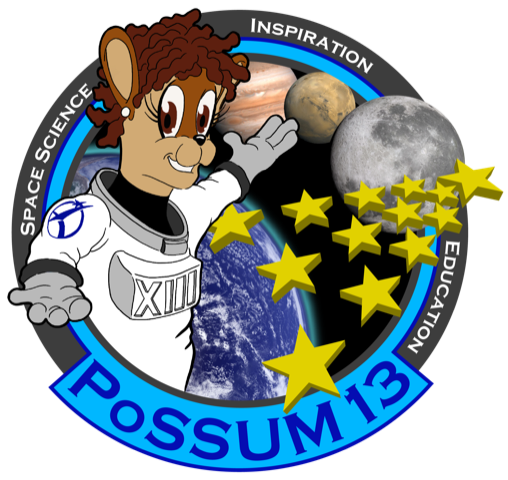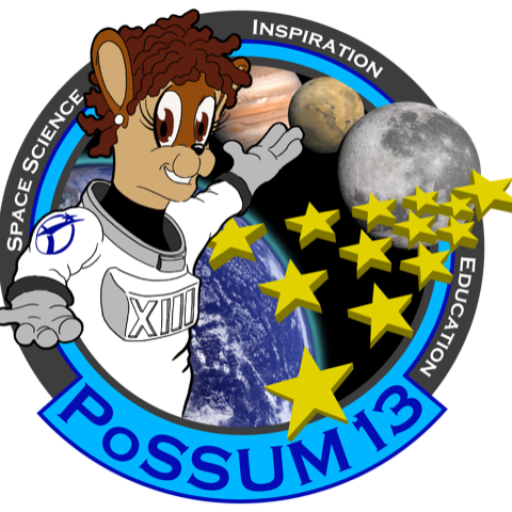Come Fly with Us!!!
Stay Posted to Submit to the 2022 PoSSUM13 Microgravity Challenge
Stay Posted to Submit to the 2022 PoSSUM13 Microgravity Challenge
The PoSSUM 13 Microgravity Flight Challenge invites female-led student teams worldwide to compete for a payload experiment aboard the National Research Council of Canada’s Falcon 20 research aircraft. This plane is capable of flying steep maneuvers called parabolas, allowing researchers to experience repeated periods of weightlessness or microgravity. Scientists use these flight conditions to study the effects of reduced gravity on humans and hardware.
In an effort to celebrate and promote the achievements of women in space science, up to two teams will be selected to fully design and build their experiment and will receive mentoring from PoSSUM Scientist-Astronaut Candidates regarding pre-flight, in-flight, and post-flight procedures. One student from the top winning team will have the opportunity to fly as a mission specialist on board the Falcon-20 as part of PoSSUM’s annual microgravity campaign (certain restrictions and conditions apply).
Project PoSSUM 2018 Microgravity Flight Research Campaign
ELIGIBILITY AND REQUIREMENTS

- Current students, 13-17 years of age. This includes students enrolled in charter schools, correspondence courses, or non-traditional institutions such as home school, robotic clubs, or community-led organizations.
- Teams of up to four students may apply, so long as the Team Lead is a female or female-identifying student.
- Teams require at least one adult mentor. Your mentor can be a parent, teacher, community leader, or a scientist.
- Department of State Export Administration Regulations (EAR) apply.
Each team should address the following in their proposal plan:
- What science question do you want to answer?
- Why is this science problem important for space exploration or life here on Earth?
- Why must it be done in microgravity?
- Is 20 seconds enough time to get useful results?
- Methodology (design diagrams can be included here)
- Proposed plan for data collection and analysis
IMPORTANT DATES AND DEADLINES

Contest Announcement (T=0) – Stay Posted!
T+14 days: Microgravity Webinar
T+90 days: Proposals Due
T+120 days: Winning Teams Announced
T+120 to 180 days: Payload Build, Mentoring
T+180 days: Student Payload Demonstration (via video conference)
T+195 days: Test Equipment Data Package Due (TEDP)
T+210 days: Payloads Shipped to Integrated Spaceflight Services
TBD: Winning Student Announced and Payloads Shipped to National Research Council of Canada
TBD: Flight Campaign (Ottawa, Canada)
COVID-19 UPDATE: Due to the current COVID-19 pandemic, all microgravity flight dates are subject to NRC authorization and Canadian border access. Dates are subject to change and will be determined based on student and crew safety. Thank you for your patience and understanding as we work through these unprecedented times.
HOW TO APPLY
Submit a written proposal and a short video explaining your idea for the experiment. Describe the science question your team wants to answer and the description of the procedures to be performed by Scientist-Astronaut candidates or Payload Specialists during the flight. Proposals shall be no more than five pages long and may include drawings describing the experiment. Please include:
1) the title of the experiment,
2) the names of all students and mentors and their roles in the project,
3) the name of school, institution, education platform, or program,
4) mission patch design,
5) a short summary or abstract, and
6) a list of equipment/materials (if applicable)
7) your experiment plan
Videos shall be no longer than two (2) minutes and can be narrated in Spanish, English, or French. They should include the following:
1) an introduction of the team,
2) a brief description of your experiment idea,
3) What excites you about having an experiment flown in microgravity?
Then upload your video to Youtube (with parent or adult mentor approval) and include a link in your application by the contest deadline.
- Feasibility of the proposed approach (15%)
- Innovation and Creativity (15%)
- Relevance of having your experiment in a reduced gravity environment (30%)
- Safety compliance – see Experiment Constraints (20%)
- Teamwork, Leadership, and Communication (20%)
Finalists Announced for the 2021 PoSSUM13 Microgravity Challenge
PoSSUM13 is excited to announce the two finalists selected for the 2020 PoSSUM 13 Microgravity Flight Challenge. This initiative invites female-led student teams worldwide to compete for a payload experiment aboard the National Research Council of Canada’s Falcon 20 research aircraft. This plane is capable of flying steep maneuvers called parabolas, allowing researchers to experience repeated periods of weightlessness or microgravity. Scientists use these flight conditions to study the effects of reduced gravity on humans and hardware.
In an effort to celebrate and promote the achievements of women in space science, the finalists will have the opportunity to fully design and build their experiment and will receive mentoring from PoSSUM Scientist-Astronaut Candidates regarding pre-flight, in-flight, and post-flight procedures. One student from the top winning team will have the opportunity to fly as a mission specialist on board the Falcon-20 in September 2020 as part of PoSSUM’s annual microgravity campaign.
Team applicants of the 2019 and 2020 microgravity challenges that were not selected as finalists will each receive an individual mentoring session from PoSSUM13 ambassadors. They will also be invited to attend three interactive PoSSUM13 workshops on the topics of the fundamentals of microgravity research, the fundamentals of the scientific method and proposal writing, and space careers.

FINALIST: Resonance in Microgravity
This team project was submitted from the Greeneville Girls After School Science Club (USA), consisting of Jennie Bulawa, Grace Evans, Samantha Henderson, Anna Jackson, and team mentor Beth Bulawa. This initiative aims to study resonance in the microgravity environment. This concept details how an external force causes another system around it to vibrate with greater amplitude – an important factor that must be considered in the development of buildings and experiments in space. To assess resonance in the absence of gravity, the team has developed an experiment consisting of an enclosed speaker, a tone generator and two sports cameras. These cameras will record how water will behave on the speakers when the tone is generated in the microgravity environment.
“Thank you for giving us, the Greeneville Girls, such an opportunity,” shared team member Grace Evans. “We are excited to explore all of the PoSSUM 13’s helpful ideas to make something awesome.”

FINALIST: Lung Capacity
This team project was submitted from Maclay School (USA) , consisting of Elizabeth Crapps, Katerina Krizner, Kathryn Merritt, and team mentor Dr. William Perry. This experiment aims to assess the amount of oxygen inhaled and exhaled during in the microgravity environment. The experiment will measure lung capacity using a peak flow meter under various gravity conditions (including high-G’s and microgravity). The experiment hopes to gain insightful data that can be applied to ensure the safety of future astronauts with physical respiratory conditions during spaceflight. This experiment focuses particularly on asthmatics.
Upon learning of their selection as a finalist, team mentor Dr. William Perry shared, “This is wonderful – this is such a great experience for the girls. They are so full of excitement!”
“Our finalists are at the caliper of seasoned college STEM students,” shared Aidyl Gonzalez, PoSSUM13 Ambassador and STEM Coordinator. “These young future world changers are incredibly intelligent, humble, and dedicated to paying it forward to their community through STEM.”
2019 MICROGRAVITY CHALLENGE FINALISTS
After a competitive evaluation period, three student team finalists were selected and flew experiments during our 2019 campaign.



The “Caring for the environment: Separation of oil and water” Team from Mexico: Nayeli Ruiz Rodriguez, Rubi Aramburo Rios, Estrella Yazarela Espinoza Barrios, and Abraham Velarde Canizales. Mentor: Susana Mendoza Rios

The 2019 PoSSUM 13 Microgravity Challenge Winner Ivanna Hernandez from Colombia demonstrates her experiment in microgravity with the Project PoSSUM team in the 2019 campaign at the National Research Council of Canada.

